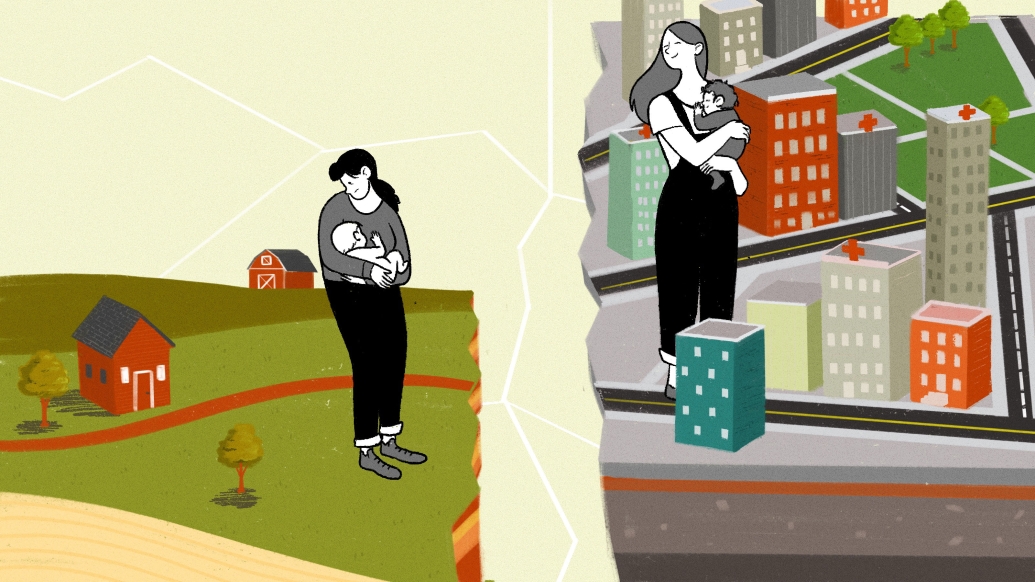Rural residents have lower rates of continuous health insurance before, during and after pregnancy compared to those in urban cities
5:05 PM
Author |

Women and birthing people in rural America face higher risks of severe maternal complications and death than their urban peers. Now, a study sheds light on one possible factor: lower enrollment in health insurance.
Residents of rural communities had lower rates of continuous health insurance before, during and after pregnancy compared to those in urban cities, according to the Michigan Medicine led research in Obstetrics & Gynecology, or “The Green Journal.”
MORE FROM MICHIGAN: Sign up for our weekly newsletter
“Being uninsured during the time of pregnancy has been associated with less adequate prenatal and postpartum care, which decreases opportunities to address risk factors affecting health outcomes for both the birthing person and baby,” said lead author Lindsay Admon, M.D., M.Sc., an assistant professor of obstetrics and gynecology at the University of Michigan Medical School and obstetrician-gynecologist at U-M Health Von Voigtlander Women’s Hospital. “Our study suggests that uninsurance disproportionately affects rural residents during pivotal stages of pregnancy. We hope these findings help inform policies that address rural–urban inequities in maternity care access and maternal health across the country.”
Previous studies indicate that rural Americans, who often have less access to local obstetric services and need to drive farther for care, are at higher risk of maternal morbidity and mortality.
A lack of health insurance may exacerbate these inequities, authors of the new study say.
Uninsured at greater risk of medical complications postpartum
Michigan Medicine researchers analyzed survey data from 154,992 postpartum individuals in 43 states between 2016-2019, including roughly 16%, or 32,178, rural residents.
They compared rates of those without any insurance or had gaps in coverage between rural and urban residents during preconception, at the time of birth, and postpartum.
In each of the three periods, rural residents who were non-Hispanic white, married and with intended pregnancies experienced greater odds of less adequate or consistent insurance compared to their urban counterparts. They were also less likely to have commercial health insurance during any of those times.
Our study suggests that uninsurance disproportionately affects rural residents during pivotal stages of pregnancy,”
Rural residents who identified as Spanish-speaking and Hispanic, however, had the highest rates of pre-pregnancy uninsurance, followed by those from Indigenous communities.
“Rural inequities persisted regardless of age, marital status or insurance type. But these differences were even more significant among specific racial and ethnic groups,” Admon said.
Nearly 13% of people living in rural areas were also uninsured by three months postpartum, representing approximately 156,000 rural residents across participating states.
With rural residents more likely to be insured by Medicaid, Admon notes, there’s greater risk of losing access since pregnancy-related Medicaid coverage typically ends 60 days after delivery. The Medicaid program supports an estimated 4 in 10 births at the time of birth overall.
This lack of coverage the year after pregnancy is especially worrisome, Admon says, since rural residents without postpartum insurance in the study were more likely to be older than 35 and have obesity or chronic hypertension compared with uninsured urban residents.
“It’s extremely concerning to see that postpartum individuals at greater risk of medical complications in the postpartum year are more likely to be uninsured,” Admon said. “Postpartum insurance disruptions are associated with lower rates of receiving recommended care to address concerns like complications related to hypertension or depression.”
She says multiple policy approaches may be considered to address inequities. Among them: efforts to improve access to commercial insurance through policies that incentivize smaller employers to provide affordable health insurance coverage for families.
“We need to explore policies that help increase insurance enrollment during all phases of pregnancy and that account for rural differences in employment and employment-based insurance,” she said. “Health insurance is critical to accessing quality healthcare and improving maternal health in the U.S.”
Additional authors include Jamie Daw, Ph.D.; Julia Interrante, M.P.H.; Bridget Ibrahim, Ph.D., M.A.; Maya Millette, B.S.; and Katy Kozhimannil, Ph.D., M.P.A.
Study cited: “Rural and Urban Differences in Insurance Coverage at Prepregnancy, Birth, and Postpartum,” Obstetrics & Gynecology. DOI: 10.1097/AOG.0000000000005081

Explore a variety of healthcare news & stories by visiting the Health Lab home page for more articles.

Department of Communication at Michigan Medicine
Want top health & research news weekly? Sign up for Health Lab’s newsletters today!





